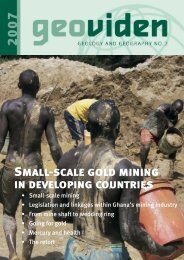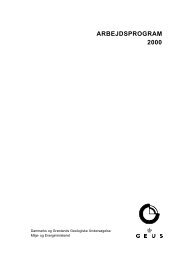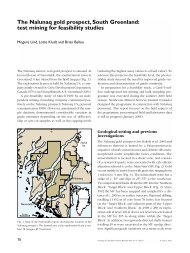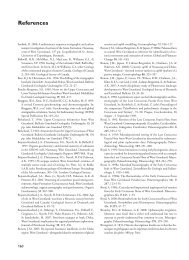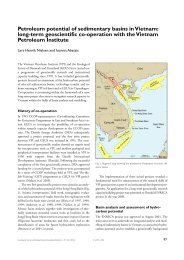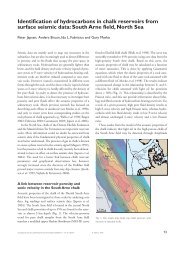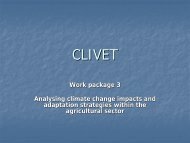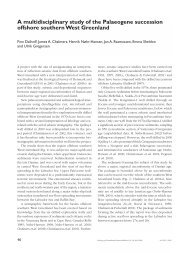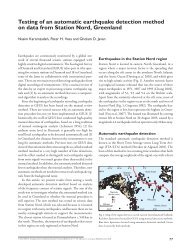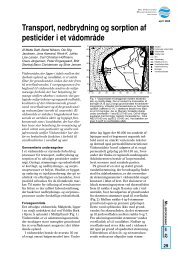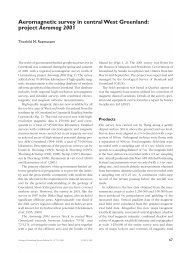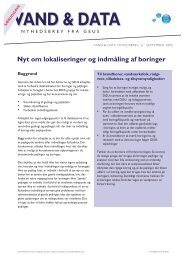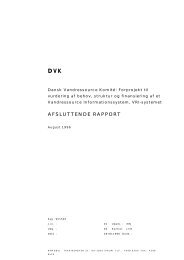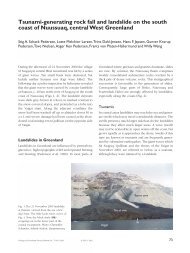Geological Survey of Denmark and Greenland Bulletin 26 ... - Geus
Geological Survey of Denmark and Greenland Bulletin 26 ... - Geus
Geological Survey of Denmark and Greenland Bulletin 26 ... - Geus
You also want an ePaper? Increase the reach of your titles
YUMPU automatically turns print PDFs into web optimized ePapers that Google loves.
as afforestation, voluntary agreements with l<strong>and</strong>owners on<br />
non-pesticide cultivation, investigations <strong>and</strong> action plans<br />
(Petersen 2011).<br />
How does the new Water Sector Law influence these networks<br />
<strong>and</strong> their associated activities? The law sets strict limits<br />
on how the water supply companies can use their financial<br />
resources. The first few trials have already shown that the<br />
Water Sector Law does not provide the framework necessary<br />
for continuation <strong>of</strong> former activities such as afforestation<br />
<strong>and</strong> networking, as the financial platform in terms <strong>of</strong> a water<br />
tax is not in accordance with the law. Both the water supply<br />
companies <strong>and</strong> the local authorities look upon this as a bottleneck<br />
in establishing <strong>and</strong> continuing effective groundwater<br />
protection (Petersen 2011).<br />
The intension behind the Water Sector Law is to ensure<br />
economically efficient company operations <strong>and</strong> at the same<br />
time the law emphasises that the main objective <strong>of</strong> the companies<br />
is to abstract, treat <strong>and</strong> distribute drinking water (Petersen<br />
2011). On the other h<strong>and</strong>, a central element is that<br />
the water supply companies are allowed – if not obliged –<br />
to perform groundwater protective activities if required by<br />
the local authorities as part <strong>of</strong> a public environmental action<br />
plan, dictated by the central authorities.<br />
As the interviews revealed, the experience <strong>and</strong> financial<br />
capacity <strong>of</strong> the decentralised water supply companies have<br />
played an essential role in the protection <strong>of</strong> the Danish<br />
groundwater over the past decades, <strong>and</strong> there is considerable<br />
concern regarding the future fate <strong>of</strong> these activities (Petersen<br />
2011).<br />
The new regulatory paradigm is by Bakker (2005) described<br />
as Market Environmentalism, where market mechanisms<br />
are to ensure efficiency, competition <strong>and</strong> sustainability.<br />
Whereas the business aspects are beyond the scope <strong>of</strong> this<br />
paper, the environmental perspective implies a movement towards<br />
a capitalisation <strong>of</strong> the environment to include resource<br />
protection in water pricing, as attempted in the UK. From a<br />
quantitative perspective, the price can reflect most <strong>of</strong> the cost<br />
related to abstraction <strong>and</strong> distribution. Qualitative groundwater<br />
protection, however, has entrenched complexities. Due<br />
to the intertemporal aspect <strong>and</strong> imperfect, although ever increasing<br />
knowledge, the financing <strong>of</strong> qualitative protection<br />
may shift during the coming years as the water supply companies<br />
are encouraged to focus more narrowly on initiatives<br />
directly related to their resource.<br />
Our study shows that combined with the recent structural<br />
reforms <strong>of</strong> the environmental management authorities, the<br />
Water Sector Law sets the stage for a shift in a formerly accepted<br />
managerial practice. This is mainly seen as a drawback<br />
as it reduces the possibilities <strong>of</strong> the water supply companies<br />
to undertake groundwater protective actions that are seen<br />
as necessary by the individual companies <strong>and</strong> leaves them in<br />
a role where they are only operators <strong>of</strong> actions dictated by<br />
the municipality. The benefits may, on the other h<strong>and</strong>, be a<br />
better coordinated <strong>and</strong> integrated water management policy,<br />
where the groundwater protection is seen in a more holistic<br />
approach that also calls for actions in areas where the water<br />
supply companies have not so far been active. However, this<br />
calls for a strong incorporated <strong>and</strong> active integrating governance<br />
strategy from the local authorities. Only the future can<br />
show how this will come out.<br />
References<br />
Bakker, K. 2005: Neoliberalizing nature? Market environmentalism in<br />
water supply in Engl<strong>and</strong> <strong>and</strong> Wales. Annals <strong>of</strong> the Association <strong>of</strong> American<br />
Geographers 95, 542–565.<br />
Jørgensen, L.F. & Stockmarr, J. 2009: Groundwater monitoring in <strong>Denmark</strong>:<br />
characteristics, perspectives <strong>and</strong> comparison with other countries.<br />
Hydrogeology Journal 17, 827–842.<br />
Kvale, S. 1997: Interview. En introduktion til det kvalitative forskningsinterview,<br />
318 pp. København: Hans Reitzels Forlag.<br />
Miljøministeriet 1999: Lovbekendtgørelsen nr 130 af <strong>26</strong>. februar 1999 om<br />
v<strong>and</strong>forsyning mv.<br />
Miljøministeriet 2009: Lovbekendtgørelsen nr 469 af 12. juni 2009 om<br />
v<strong>and</strong>sektorens organisering og økonomiske forhold.<br />
Pedersen, P.E. 2010a: V<strong>and</strong>forsyninger under hårdt pres. Vækst 131(2),<br />
12–13.<br />
Pedersen, P.E. 2010b: Et væld af metoder til grundv<strong>and</strong>sbeskyttelse. Vækst<br />
131(2). Only available online: http://www.hedeselskabet.dk/page.6360.<br />
aspx?recordid6360=335<br />
Petersen, J.D. 2011: Dyrebare dråber. V<strong>and</strong>forsyningernes rolle i grundv<strong>and</strong>sbeskyttelse,<br />
86 pp. Unpublished Master thesis, Roskilde Universitet,<br />
Danmark.<br />
Sørensen, E. & Torfing, J. 2005: Netværksstyring: fra government til governance,<br />
218 pp. Frederiksberg: Roskilde Universitetsforlag.<br />
Thorling, L., Hansen, B., Langt<strong>of</strong>te, C., Brüsch, W., Møller, R.R., Mielby,<br />
S. & Højberg, A.L. 2011: Grundv<strong>and</strong>. Status og udvikling 1989–2010,<br />
139 pp. Særudgivelse. København: De Nationale Geologiske Undersøgelser<br />
for Danmark og Grønl<strong>and</strong>. Only available online: http://www.<br />
geus.dk/publications/grundv<strong>and</strong>sovervaagning/1989_2010.htm<br />
Authors’ addresses<br />
J.D.P., Roskilde University, Department <strong>of</strong> Technological <strong>and</strong> Socio-Economic Planning, Universitetsvej 1, DK-4000 Roskilde, <strong>Denmark</strong>.<br />
E-mail: dyrby@ruc.dk<br />
L.F.J., <strong>Geological</strong> <strong>Survey</strong> <strong>of</strong> <strong>Denmark</strong> <strong>and</strong> Greenl<strong>and</strong>, Øster Voldgade 10, DK-1350 Copenhagen K, <strong>Denmark</strong>.<br />
52



